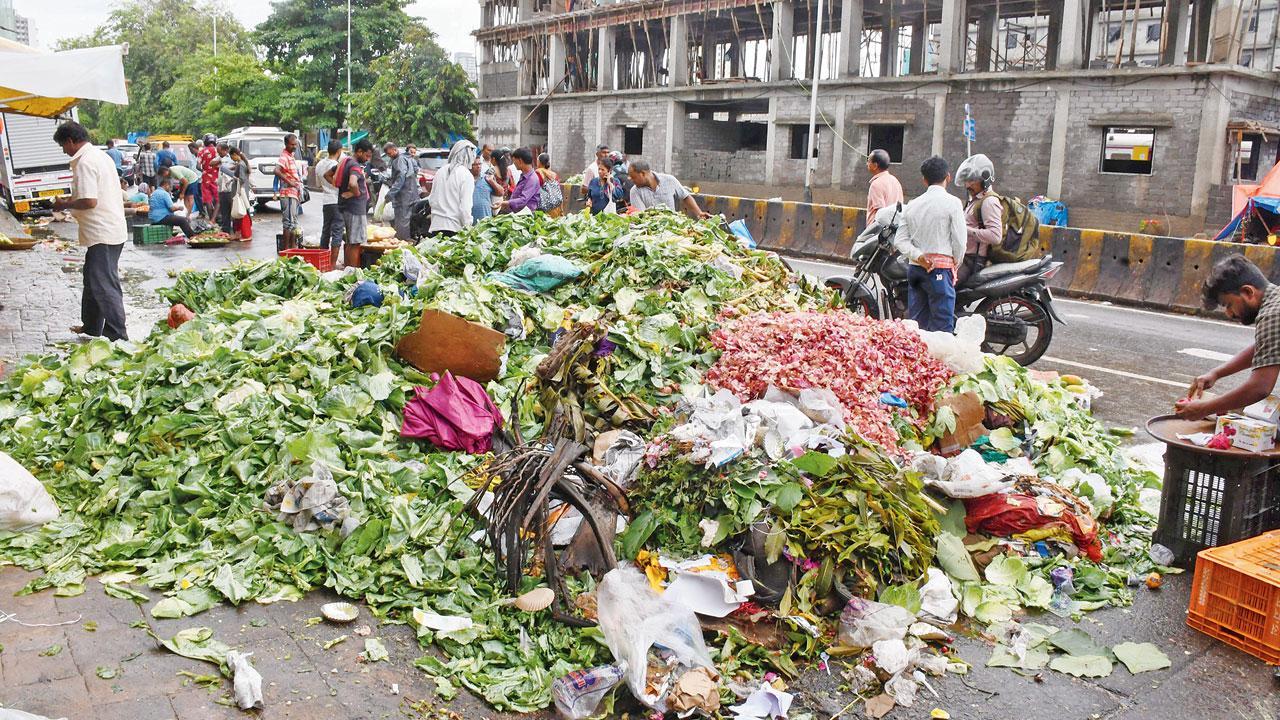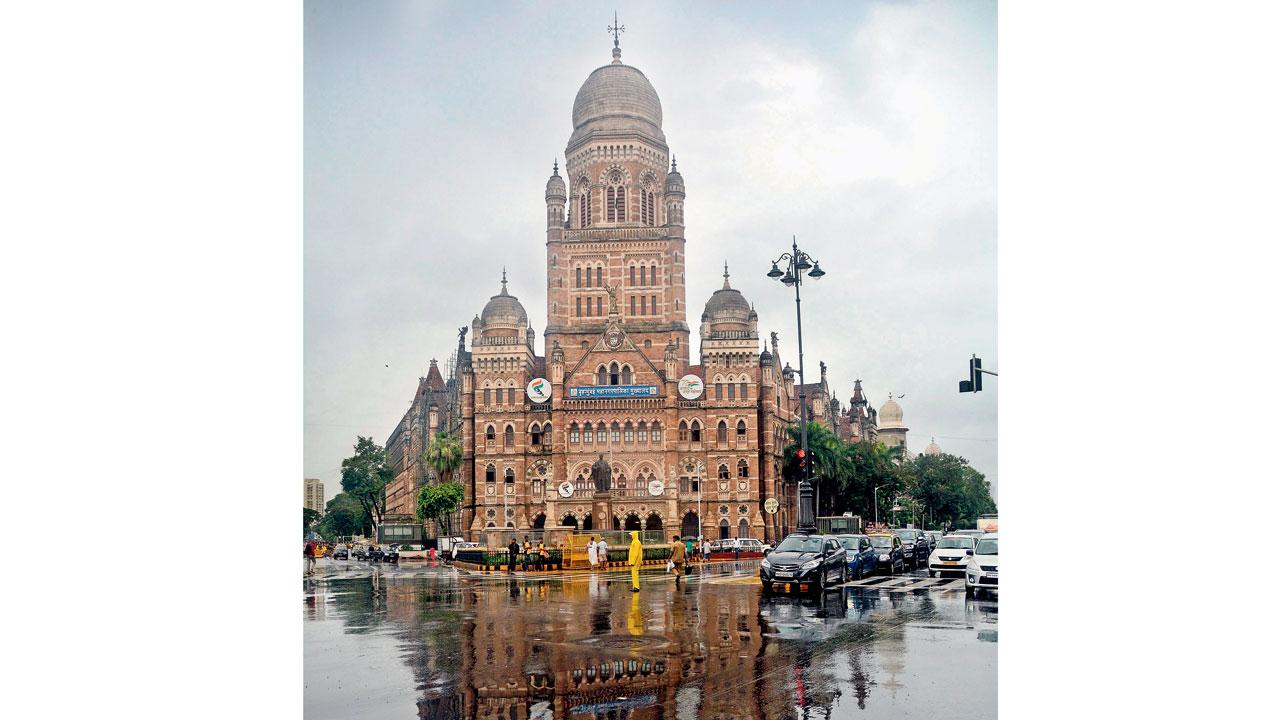Class divide obvious as mid-day’s reportage on absence of BMC corporators reveals high-rises, posh societies have means like clout and social media to get work done; it is the poorer strata that suffers

Rotting vegetables on Tulsi Pipe Road in Dadar on June 29. Residents used to rely on corporators to resolve solid waste management woes in slum areas. Pic/Ashish Raje
Mumbai has been governed in the absence of corporators for over a year now, but does the average Mumbaikar miss them at all? Are civic councillors really the crucial link between the administration and the people and do citizens need them in the era of social media and helplines? In the first of a multi-part series, mid-day spoke to various stakeholders—including activists, former babus and even ex-corporators—to find the answers to these questions.
The term of the 227 corporators elected in 2022 ended at midnight on March 7. Statutory civic committees have ceased to be. The city is currently being run by an administrator, the municipal commissioner, for the second time in the history of the Brihanmumbai Municipal Corporation (BMC) and for the first time in 40 years since the 1980s when the municipal polls had been delayed.
 The Brihanmumbai Municipal Corporation headquarters on June 30. Pic/Sayyed Sameer Abedi
The Brihanmumbai Municipal Corporation headquarters on June 30. Pic/Sayyed Sameer Abedi
When corporators are in charge, decisions regarding work involving financial transactions are taken by panels such as the standing committee. The other committees are education, health, improvements and law. Proposals are sanctioned by the general body meeting which is attended by all corporators. In the absence of corporators, the civic chief is the de-facto administrator and any work-related proposal is tabled and discussed by the additional and deputy municipal commissioners of the departments concerned before it is placed before the administrator for approval.
mid-day spoke to the citizens from different eco-social strata to gauge their perception of corporators and to find out if they played a vital role in their day-to-day lives. One issue faced by Mumbaikars is the daunting nature of civic offices whose staffers comprise a complex hierarchy and where the solutions to their problems are not easily offered. Often, it is corporators to whom the common man turns to redress their grievances.
‘They are indispensable’
Sachin Kale, a Dharavi resident, believes civic councillors are indispensable. “In slum areas, we face issues related to water supply and solid waste management regularly. Not every Dharavi resident can deal with civic officials. It is not possible for us. They refuse to entertain us. That’s why we need corporators who can be our voice.”
Anil Galgali, a civic activist, said that corporators give priority to issues based on their own opinions and personal interests. “A corporator may win from a certain constituency but does not represent 100 per cent of the citizens. For this, the administration needs to pay attention to public participation. When the citizens are directly involved, the administration will immediately realise the facts and understand the true situation,” he said.
Ashok Gupta, president of Breach Candy Residents’ Association and vice-president of Marine Drive Citizens Association, said, “The absence of corporators has made very little difference to us. If we have any issues around our areas, we contact the ward offices and get them resolved. In the past one year, we haven’t missed them at all. The difference is felt only when it comes to policy decisions and bigger projects. For example, in certain areas, there is not enough parking space available. MLAs and corporators can intervene and see to the issue at the ward level.”
Former mayor’s take
Former Mayor Nirmala Samant Prabhavalkar termed corporators necessary for citizens and the city. “The administration is not representative of citizens. Some NGOs also participate in civic issues, but they do not have access to the administration like corporators. The corporators are elected through the democratic process and they have various tools like general body meetings or any other committee meetings, to solve the issues of their wards. Citizens or NGOs don’t have access till this point where the administration is obliged to give an answer. Likewise, the mayor and committee chairpersons can also give instructions to the administration on various issues.
Corporators participate in policymaking; they include citizen-oriented views in the civic policies. A corporator is more accountable to the citizens than an administrative officer, as the people elect the former. Now, since the corporators do not exist, the administrator is running things as per his will. Members of the Legislature Assembly and Members of the Parliament are also people’s representatives. But their duties are decided by democracy; corporators and local self-governing bodies’ duties are also decided by democracy; 70-80 per cent of day-to-day issues are related to local self-government and corporators must solve them.
‘This is democracy’
Madhukar Kamble, former deputy municipal commissioner, said, “In a democracy, the people’s representatives, judiciary and administration counterbalance each other. There are honest officers who are doing good work but can’t reach every place. A corporator is close to the voter. He goes to citizens and tries to solve their problems as he needs to prove himself as a representative of the people. I see many public representatives working till late at night and resuming early in the morning. They are working for the betterment of their voters. This is democracy. There is a need for corporators.”
Money saved
The absence of corporators has saved the BMC around Rs 37 to Rs 39 crore in one year. The money saved would have otherwise been spent on allowances and cars used by the mayor and committee members. The mayor has three automobiles, and the maintenance, fuel expenses and drivers’ wages, among other costs, of each come up to Rs 1.5 lakh per year. The BMC spends Rs 11 to 12 crore on the general body every year, including Rs 7 crore on honoraria and allowances.
The figure does account for the salary of civic employees who are working for committees and the general body. Meanwhile, the BMC has saved 60 tonnes of paper, which would have been used to print the agenda of committee meetings, costing Rs 1.33 core. BMC also saved around Rs 24 lakh, which would have been spent on the mayor’s bungalow. The BMC budget for the year 2023-24 is Rs 52,619 crore, including administration and infrastructure expenses.
March 7
Day the corporators’ term ended in 2022
Rs 52,619cr
BMC budget for 2023-24
Have your say
Send us the details at mailbag@mid-day.com
WhatsApp us at 7021423100
 Subscribe today by clicking the link and stay updated with the latest news!" Click here!
Subscribe today by clicking the link and stay updated with the latest news!" Click here!










